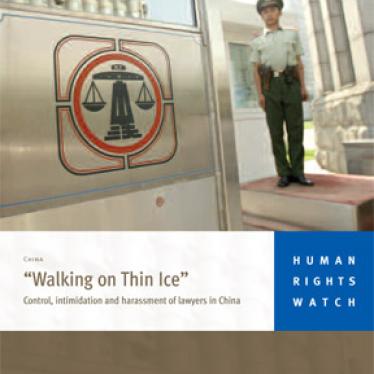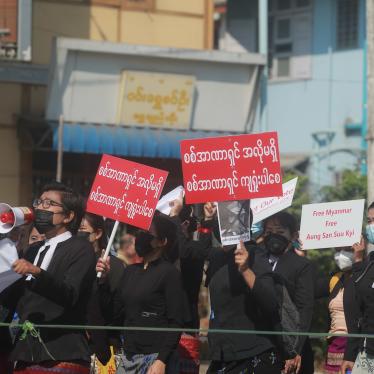(New York) - The Chinese government should immediately release three prominent lawyers arbitrarily detained and feared forcibly disappeared this month, Human Rights Watch said today. Human Rights Watch also reiterated its call for the Chinese authorities to end the arbitrary house arrest imposed on Liu Xia, the wife of Nobel Peace Prize laureate Liu Xiaobo, and on the blind legal activist Chen Guangcheng and his family.
Lawyers Tang Jitian, Teng Biao, and Jiang Tianyong were separately taken away by Public Security agents last week in Beijing and have not been seen or heard from since. The authorities have failed to give any reason or formal notification to their relatives, and all three are believed to be at risk of ill-treatment and torture.
"Citizens' demands for the state to respect its own laws are getting louder," said Sophie Richardson, Asia advocacy director at Human Rights Watch. "But the government is responding with even less regard for legal procedures, arbitrarily arresting lawyers and placing well known activists and their family members under illegal and indefinite detention."
Police forced their way into Tang Jitian's Beijing apartment early on the morning of February 16, 2011, and immediately took him away, returning later to search the apartment. Jiang Tianyong was arrested in Bejiing on the afternoon of February 19 while visiting his brother. Several men forced him into a car, and the police returned later that day to seize his computer. Teng Biao, a lecturer at China University of Political Science and Law, was arrested the same afternoon. Police searched his home the next day and seized two computers, as well as several books, documents, and DVDs.
All three activists are leading lawyers from the weiquan, or "rights protection" movement, whom the government has deprived of their professional licenses in recent years. Judicial authorities have done this apparently in retaliation for the lawyers' refusal to desist from cases that the authorities see as politically sensitive such as abuses of power, wrongful convictions, and illegal land seizures.
Under international law, authorities commit an enforced disappearance when they fail to acknowledge holding someone in custody or provide no information on the person's fate or whereabouts. "Disappearances" increase the likelihood of torture or other ill-treatment, Human Rights Watch said.
The detention of at least two of the three lawyers in recent days appears to be linked to recent developments regarding the blind, self-taught legal activist Chen Guangcheng. Chen and his family have been under strict detention outside of any legal procedure at their home in the countryside ever since he was released from prison in September 2010. On February 10, 2011, a video he made documenting his detention and persecution was made public for the first time, prompting legal activists to seek ways to assist him and denounce the illegal character of his detention.
Foreign journalists who tried to visit Chen, including from CNN and the New York Times, were assaulted by thugs guarding access to his village. Activists, including Jiang and Teng, met in Beijing to discuss Chen's case on February 19; Jiang and Teng were detained shortly after that meeting.
Chen's case echoes the persecution of Liu Xia, the wife of Nobel Peace laureate Liu Xiaobo. Following the announcement of the prize in October 2010, the Chinese government placed Liu Xia under strict house arrest, progressively depriving her of any freedom to communicate with the outside world. On February 20, 2011, the Washington Post published her first reported words since being placed under house arrest four months earlier. In a brief online conversation she told of being "miserable" and of being held "hostage" with her family by the government. She also said she had not been allowed to visit Liu Xiaobo in prison since she went there under police escort on October 11, 2010. The arbitrary detention of the spouse of a Nobel laureate for winning the award is unprecedented in the prize's history.
The increased use of extrajudicial detentions, or "soft detention" (ruanjin) in police parlance, began with preparations for the 2008 Beijing Olympic Games, at a time when the Chinese authorities were apparently keen to neutralize dissidents and critics while avoiding the international condemnation that would accompany high-profile criminal trials of dissidents. Since then, the police have continued to expand the scope of the people that it subjects to such arbitrary measures and even increasingly resorted to criminal tactics to intimidate or forcibly disappear critics, subjecting them to abductions, beatings, and threats of retaliation against family members.
The prohibition against arbitrary arrest and deprivation of liberty is a central tenet of Chinese and international human rights law. Under Chinese law, the police must notify the relatives of anyone arrested within two days. There are no legal statutes that allow for indefinite house arrest.
"There is nothing 'soft' about 'soft detention' - it is a life in limbo outside the protection of the law," said Richardson. "The Chinese government should immediately release these activists and their family members. A failure to do so demonstrates a preference for thuggery over the rule of law."







